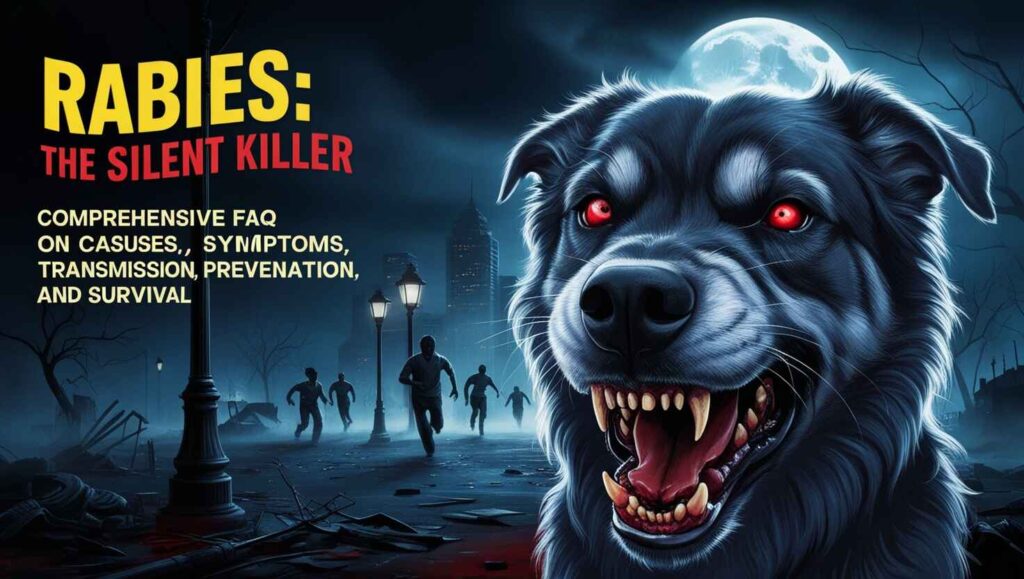Contents
FAQ on Rabies:

1. General Information About Rabies
1. Who found the cure for rabies?
Louis Pasteur.
He developed the first rabies vaccine in 1885, which was a groundbreaking achievement in medicine.
2. Why can’t we cure rabies?
We can’t because the virus spreads to the brain quickly.
Once symptoms show, it becomes nearly impossible to stop.
3. What is rabies?
Rabies is a deadly virus.
It spreads through bites or saliva from infected animals, attacking the nervous system.
4. Why is rabies so scary?
Because it’s almost always fatal.
The symptoms are severe, and once they appear, death is almost certain.
5. Is rabies 100% preventable?
Yes. Getting vaccinated and avoiding contact with wild or stray animals can fully prevent rabies infection.
6. Is rabies 100% treatable?
No. After symptoms show, it’s extremely rare to survive, which is why early prevention is key.
7. Has anyone ever survived rabies?
Yes, but it’s very rare.
A few people survived with intense treatment, but it’s not a reliable cure.
2. Transmission of Rabies
FAQ on Rabies
1. Can you get rabies from a scratch?
Yes, but it’s rare. If the scratch is deep and infected with saliva, rabies transmission is possible.
2. Can you get rabies if a dog licks you?
Usually no.
Rabies is unlikely unless saliva gets into an open wound or mucous membranes like eyes.
3. Can dry saliva transmit rabies?
No. The virus dies quickly when saliva dries, making dry saliva non-infectious.
4. Can rabies spread by touching a dog?
No.
Simply touching a dog or its fur won’t transmit rabies since the virus spreads through bites or wounds.
5. Can dog licking cause rabies?
Unlikely. It’s possible only if the saliva enters a wound or mucous membrane.
6. Do dog bites always cause rabies?
No.
Rabies occurs only if the biting dog is infected, which isn’t always the case.
3. Symptoms of Rabies
FAQ on Rabies
1. Do rabies patients bark?
No.
People with rabies don’t bark, but they may have unusual behaviors due to brain effects.
2. Why do dogs get angry when they have rabies?
The virus affects their brain.
It causes aggression, making them bite and spread the disease to others.
3. Do dogs with rabies cry?
Yes, sometimes.
Dogs may howl or cry because rabies causes pain, confusion, and severe distress.
4. How do I know if I have rabies?
Watch for symptoms like fever, confusion, and fear of water.
But symptoms mean it’s often too late.
5. When do rabies symptoms start?
Usually 1 to 3 months after exposure.
Sometimes it takes a few days or even years, though.
6. Why does rabies cause fear of water?
Rabies affects swallowing muscles.
This makes drinking painful and creates a reflexive fear of water.
4. Animals and Rabies
FAQ on Rabies
1. What animals cannot get rabies?
Reptiles such as birds, snakes, and lizards are not susceptible to this disease. Rabies can only be transmitted to mammals.
2. What animal has rabies the most?
Bats.
In many regions, bats are the ones that spread this disease the most, followed by foxes and wild dogs.
3. Do all bats have rabies?
No.
Only some bats have this disease. But if you are bitten by a bat, you should go to the doctor immediately. Very important!
4. Why do bats bite us while we sleep?
They don’t bite us all that often.
It happens very rarely. They may bite us accidentally while looking for something to eat or a place to stay.
5. Do dogs with rabies bark?
Yes, But it will be a little different. Dogs with rabies will be very aggressive or act strangely.
6. Are friendly dogs rabid?
It’s unlikely.
Dogs with rabies will be normal, not aggressive or act strangely. They will not be affectionate.
5. Prevention and Vaccination
FAQ on Rabies
1. A week too late for a rabies vaccine after a bite?
No, but it is risky.
The vaccine works best when taken immediately, so don’t delay seeking medical advice.
2. Is one shot of rabies enough?
No.
Rabies treatment requires multiple doses over several weeks to ensure full protection.
3. Are rabies shots painful?
Not much.
They’re like regular shots now, unlike the older painful ones given in the stomach.
4. How many years does anti-rabies last?
Around 1–3 years.
For those at high risk, booster injections are recommended to maintain immunity
5. Do I need to take the rabies vaccine again after a dog bite?
Yes. If the dog is not vaccinated, even if vaccinated earlier, consult a doctor to verify if boosters are needed.
6. What happens if a dog nail scratches you with no blood?
You’re likely safe.
If there’s no wound or saliva exposure, rabies risk is extremely low, but clean it.
7. What not to eat after a dog bite?
No restrictions.
There’s no specific diet restriction, but focus on good nutrition to support healing.
6. Cost and Availability of Rabies Treatment
FAQ on Rabies
1. What is the cost of a rabies injection?
It varies widely.
In many countries, it costs $40–$300 per dose, depending on location and availability.
2. Why is the rabies vaccine so expensive?
Production is complex.
The cost covers research, production, and limited demand compared to common vaccines.
3. Has the rabies vaccine killed anyone?
Extremely rarely.
Severe allergic reactions are very uncommon, making the vaccine generally very safe.
4. Is the rabies vaccine 100% safe?
Almost.
It’s highly safe, with most side effects being mild, like soreness or temporary fever
7. Survivors of Rabies
FAQ on Rabies
1. Who is the girl cured of rabies?
Jeanna Giese.
She was the first person to survive rabies without a vaccine using an experimental treatment in 2004. And Angel Wawrzyniak (2008) and Precious Reynolds (2011) also survived.
2. How many people have survived rabies?
Fewer than 20 worldwide.
Most survived through intense medical interventions, but cases are extremely rare.
8. Bats and Rabies
FAQ on Rabies
1. What if a bat touches you?
Seek medical advice immediately.
Even without a bite, contact with bats might require a rabies vaccine as a precaution.
2. Do bat bites hurt?
Not usually.
Their bites are small and painless, It is the reason they often go unnoticed.
3. What do bat bites look like?
Tiny puncture marks.
They’re usually so small and faint that they can be difficult to identify
4. Can we survive a bat bite without a rabies vaccine?
Not likely if the bat is rabid.
Without the vaccine, rabies is nearly always fatal once symptoms begin
5. Why do bats bite us while sleeping?
It’s rare and often accidental.
They might mistake you for food or be exploring out of curiosity
Here, you can gain a better understanding of rabies survival: Can You Survive Rabies? Exploring Rabies Survival Cases and Fatality Rates
